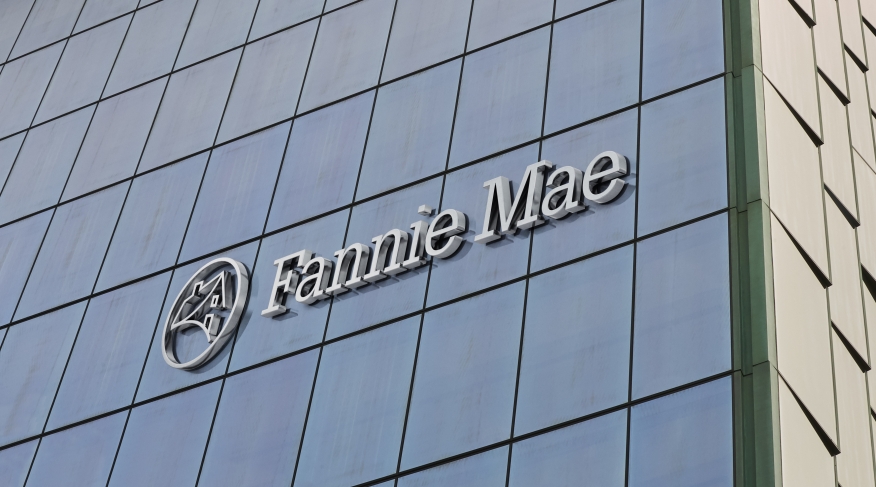
Fannie Mae Says It's $262B Short Of Being Fully Capitalized

CFO cites figure as GSE releases its 2Q earnings report.
- Fannie Mae today reported second-quarter net income of $4.7 billion, up 6.8% from $4.4 billion in the first quarter but down 34.7% from $7.2 billion in the second quarter of last year.
- Fannie Mae said net interest income in the second quarter was $7.8 billion, up 5.5% from $7.4 billion in the first quarter.
- Fannie Mae said it acquired 334,000 home purchase loans and 240,000 single-family refinance loans during the second quarter.
The Federal National Mortgage Association, or Fannie Mae, remains severely undercapitalized, even as it reported solid earnings for the second quarter of 2022.
Fannie Mae today reported second-quarter net income of $4.7 billion, up 6.8% from $4.4 billion in the first quarter but down 34.7% from $7.2 billion in the second quarter of last year. It attributed the quarterly gain in net income primarily to an increase in net interest income.
Despite the year-over-year drop in net income, the enterprise’s net worth continued to grow. Fannie Mae said its net worth at the end of the second quarter was $56.4 billion, up nearly 19% from $47.4 billion at the end of 2021. Since 2018, when it was $6.2 billion, Fannie Mae’s net worth has grown nearly 810%.
However, the enterprise said it remains significantly undercapitalized. During an earnings conference call today, for which no questions were accepted, Executive Vice President and Chief Financial Officer Chryssa Halley said Fannie Mae estimates it is $262 billion short of being fully capitalized.
That figure was announced just over a week after Federal Home Housing Finance Agency Director Sandra L. Thompson told the U.S. House Committee on Financial Services that both Fannie Mae and Freddie Mac need $300 billion, combined, in reserves to be fully capitalized.
During last week’s hearing, Thompson said Fannie Mae’s capital reserves increased from $14.6 billion at the end of 2019 to $51.8 billion by March 31, 2022, while Freddie Mac’s reserves increased from $9.1 billion to $31.7 billion. Combined, that’s $83.5 billion in reserves, or about 27% of the $300 billion combined target Thompson identified.
Fannie Mae did not respond to a request for comment.
In its earnings report, Fannie Mae said net interest income in the second quarter was $7.8 billion, up 5.5% from $7.4 billion in the first quarter. It said higher income on investments as a result of increases in interest rates during the quarter contributed to an increase in net interest income from the enterprise’s retained mortgage portfolio and other investments portfolio.
Fannie Mae said it acquired 334,000 home purchase loans and 240,000 single-family refinance loans during the second quarter. The single-family home purchase acquisitions totaled $111 billion, nearly 50% of which were for first-time homebuyers.
Other highlights:
- Refinance acquisition volume was $61.3 billion in the second quarter, down nearly 55% from $135.5 billion in the first quarter, due to higher mortgage rates.
- The single-family serious delinquency rate decreased to 0.81% as of June 30, 2022, from 1.01% as of March 31, 2022. The decrease was driven by borrowers exiting forbearance through a loan workout or otherwise reinstating their loan, Fannie Mae said. Single-family seriously delinquent loans are those that are 90 days or more past due or in the foreclosure process.
- The multifamily serious delinquency rate decreased to 0.34% as of June 30, 2022, down from 0.38% as of March 31. Multifamily seriously delinquent loans are loans that are 60 days or more past due.
- As of June 30, more than 95% of the loans in Fannie Mae’s multifamily guaranty book of business that had received a forbearance, measured by unpaid principal balance, were in a repayment plan or reinstated.
- Fannie Mae financed 156,000 units of rental housing, a significant majority of which were affordable to households earning at or below 120% of area median income, it said.
David C. Benson, Fannie Mae’s president and CEO, praised the second-quarter results. “Our solid second quarter results enhance our financial strength, and we remain focused on both managing risk and serving our mission to provide sustainable and affordable financing for the benefit of renters and homeowners.”
Citing high inflation, the Federal Reserve’s efforts to bring it under control, and the impact of those efforts on the housing market and mortgage rates, Benson added that Fannie Mae is “fully aware that we are in a highly unusual and fully volatile global economic environment. So we must expect the unexpected.”




